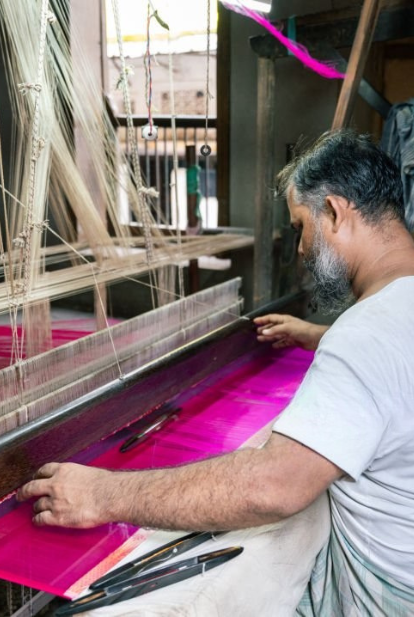Reading Time: 4–5 minutes
Table of Contents
1. A Stitch in Time:How Clothing Lost Its Value
2. The Shocking Truth Behind Your Rs 500 T-Shirt
3. Why Ethical Fashion Matters More Than Ever
4. How to Become Conscious Customer
5. The WeaveHand Promise
6. Final Thought
7. Ready to Make a Change
A Stitch in Time: How Clothing Lost Its Value
Our grandparents owned few garments, but each piece was treasured. In traditional Indian homes, clothing was:
Handwoven by local artisans.
Passed down through generations.
Repaired and reused until beyond mending.
Then came the 1990s, when "fast fashion" turned clothing into disposable items. Today, the average person buys 60% more clothes than 20 years ago - but keeps them for half as long. At Weavehand, we're fighting this trend by bringing back the true value of clothing.
The Shocking Truth Behind Your ₹500 T-Shirt
1. Human Cost: Who Really Pays?
That bargain top likely came from:
Underpaid workers (garment workers earn just ₹6,000-10,000/month)
Dangerous factories (remember Rana Plaza collapse?)
Child labor (still common in some supply chains)
Weavehand Difference: Our artisans earn 3-4x standard wages in safe, dignified conditions.
2. Environmental Disaster
Fast fashion is the:
2nd largest polluter after oil
Producer of 20% wastewater** globally
Source of 35% microplastics in oceans
Did You Know? One cotton t-shirt needs 2,700 liters of water - enough for 3 years of drinking water!
3. Quality That Doesn't Last
57% of fast fashion ends in landfill within 1 year.
Polyester blends shed microfibers in every wash.
Poor stitching means clothes fall apart quickly.
Why Ethical Fashion Matters More Than Ever
1. It Saves Lives
Choosing brands like Weavehand means:
Supporting fair wages
Rejecting child labor
Keeping artisans employed
2. It Protects Our Planet
Ethical clothing uses:
Natural, biodegradable materials
Non-toxic dyes
Zero-waste production
3. It Actually Saves You Money
While ethical fashion costs more upfront:
Lasts 5-10x longer than fast fashion
Develops character over time
Becomes heirlooms you'll treasure
How to Become a Conscious Consumer
1. Buy Less, Choose Well
Invest in 5 quality pieces instead of 15 cheap ones
2. Check Brand Ethics
Look for transparency like Weavehand's artisan stories
3. Care for Your Clothes
Wash less, mend holes, repurpose old fabrics
4. Support Circular Fashion
Swap, donate, or recycle instead of trashing
The Weavehand Promise
When you choose us, you get:
Handcrafted by skilled Indian artisans.
Natural fabrics that breathe.
Timeless designs that never go out of style.
Direct impact on weaver communities.



